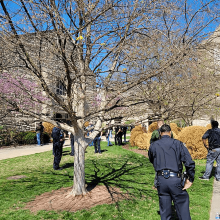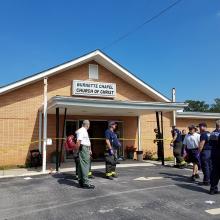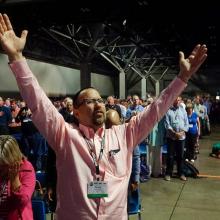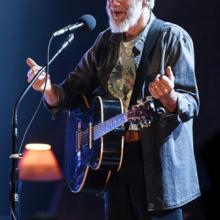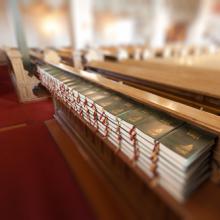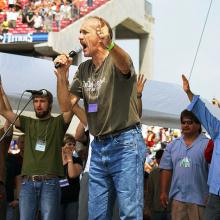Nashville
Flamy Grant called in to her morning interview after participating in a day-long silent retreat. Well, not a silent retreat exactly — it was a vocal rest.
After spending the last year touring the U.S. off the success of her album, Grant, who prefers to use her stage name in interviews, needed to rest her voice. Since her rise to Christian music stardom — or infamy, depending on how one feels about a drag queen topping the Christian charts — she has performed in bars, clubs, and churches spreading the good news in glitter.
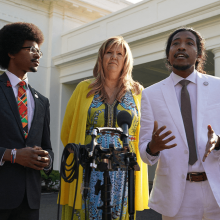
Tennessee Democratic state representatives Justin Pearson and Justin Jones, who faced expulsion over their participation in gun control protests, and Gloria Johnson, who retained her seat, speak to members of the media following their meeting with President Joe Biden (D) at the White House in Washington, D.C., April 24, 2023. REUTERS/Kevin Lamarque
Justin Pearson ran against Jeff Johnston, and Justin Jones ran against Laura Nelson. According to The Tennesseean, Jones won nearly 80 percent of the vote in Nashville, and Pearson won more than 90 percent in Memphis.
A shooting at a private Christian school in Nashville, Tenn., on Monday morning, left multiple victims before police "engaged" the gunman, leaving the suspect dead, local officials said.
The Sept. 24 shooting that left one woman dead and seven others injured conjures up memories of high-profile attacks, like the June 2015 massacre at Emanuel African Methodist Episcopal Church in Charleston, South Carolina that left nine dead.
“Barack Obama didn’t divide us,” said Nathan A. Finn, dean of the School of Theology and Missions at Union University, a Southern Baptist college in Jackson, Tenn.
“Donald Trump divided us. His personal behavior, his policy views, his temperament and character, his religious values, all were highly questionable.”
The members had no idea that word of their efforts to start the Islamic Center of Nashville had reached Yusuf Islam, the famous British musician and Muslim convert also known as Cat Stevens, until his check arrived in the mail.
“I was thinking, ‘What a miracle,’” said Elberry, who was a Vanderbilt University graduate student from Egypt at the time.

Belmont University/Wikimedia Commons
A Belmont University freshman “is no longer a student” at the Christian school after sending a racist Snapchat post about three African-American football players who had protested the treatment of minorities in America.
The post was sent under the Snapchat username “juswoodard97” during the Sept. 19 game between the Philadelphia Eagles and Chicago Bears at Soldier Field in Chicago.
It showed Eagles players Malcolm Jenkins, Ron Brooks, and Steven Means with their fists raised during the national anthem and was captioned with a racial slur followed by this threat: “Every one of them needs a damn bullet in their head. If you don’t like this country get the hell out.”

Image via Heidi Hall / RNS
The first people that fugitives encountered when they surrendered themselves on a humid September weekend weren’t cops, judges, marshals, or anyone else associated with the criminal justice system.
They were met by a phalanx of smiling, middle-aged church ladies, their vivid blue Galilee Missionary Baptist T-shirts unmistakable under the bright skies, smiling and holding open the door. Two other church volunteers collected belts and keys and sent the visitors through a metal detector.
And then they met Veda Gooch, a Galilee member standing on the other side, quick with a guiding touch on the arm or even a hug if they needed it.
“Y’all here to sign up?” she asked quietly.
BORDERED BY strip malls, chain restaurants, and drug stores, four-lane Hillsboro Pike in Nashville, Tenn., carries cars from the Vanderbilt University area out to suburban neighborhoods. Every afternoon, thousands of drivers heading home from the city crest a ridge and pass a long, red-brick church.
That church, Calvary United Methodist, is where I was confirmed, participated in youth group, and sang in the choir. In the archives room off the education wing, a visitor can open a filing cabinet drawer, flip past photos of youth group retreats and church league basketball games, and find a manila folder labeled “Rev. Dr. Sam Dodson, 1958-1965.”
The folder is thin, but its contents are weighty. A letter to the local Methodist bishop from the church’s board explains that Dodson cannot adequately minister to his congregation while participating in political activities and suggests he be demoted to assistant pastor. A newspaper clipping from 1965 announces that Rev. Dodson and his family will be moving to Athens, Greece, where he will head St. Andrew’s American Church. I recognize some of the names signed to letters calling for Dodson’s demotion—an usher who pressed strawberry candies into my palm whenever I asked, a woman who looked me in the eye when I was 11 and told me I would be a leader in the church someday.
Most songwriters in Nashville want to get their songs on the radio. Keith and Kristyn Getty hope their songs end up in dusty old hymnbooks.
The Gettys, originally from Belfast, Ireland, hope to revive the art of hymn writing at a time when the most popular new church songs are written for rock bands rather than choirs.
They’ve had surprising success.
One of the first songs that Keith co-wrote, called “In Christ Alone,” has been among the top 20 songs sung in newer churches in the United States for the past five years, according to Christian Copyright Licensing International. It is also a favorite in more traditional venues — including the recent enthronement service for Archbishop of Canterbury Justin Welby.
Hearing that hymn sung by a boys’ choir with a brass ensemble and thousands of worshippers was a thrill for Keith Getty, a self-described classical nerd.
A moving feature piece in Thursday's Washington Post described a program that is helping veterans make the transition from war to civilian life through the arts — specifically music.
Staff Sergeant Kenneth Sargent sustained a serious spinal injury during a rocket attack in Iraq. After his struggle to walk again while readjusting to civilian life, he wanted to show the country doesn’t understand its soldiers and what they went through. So, he recently spent a weekend at a retreat near Colorado Spring sponsored by LifeQuest Transitions, a nonprofit organization dedicated to empowering veterans.
Paired with professional songwriters, Sargent began to tell his story. As the words came out, the writers “pick them up, assign them a shape, a melody, bending them into rhyme. Ninety minutes later, they’ve finished ‘It Is What It Is,’ a song about a soldier finally embarking on the homeward journey that he’s long anticipated — but in a medevac helicopter.”
Though I treasure my Pentecostal heritage, these days I feel like an outsider looking in, because though it started out as a pacifist movement in the early 20th century, today Pentecostalism (at least in America) is largely known as a religion that spawns extremist movements that trumpet militarism and bigotry.
Chief exhibit: The Call
Founded by Lou Engle, The Call is a movement that regularly holds massive prayer events in stadiums across the country. Engle is part of a network called the New Apostolic Reformation, which believes that God is raising up an end-times army of apostles and prophets to take over earthly governments before Jesus comes back.
A few of its prominent leaders are Peter Wagner, Cindy Jacobs, Rick Joyner, and Mike Bickle. Though the end-times theology of these individuals may vary, the underlying principle that binds them together is the idea that Christians are called to dominate earthly governments and civil society, and that apostles and prophets are supposed to pave the way to make that happen.

